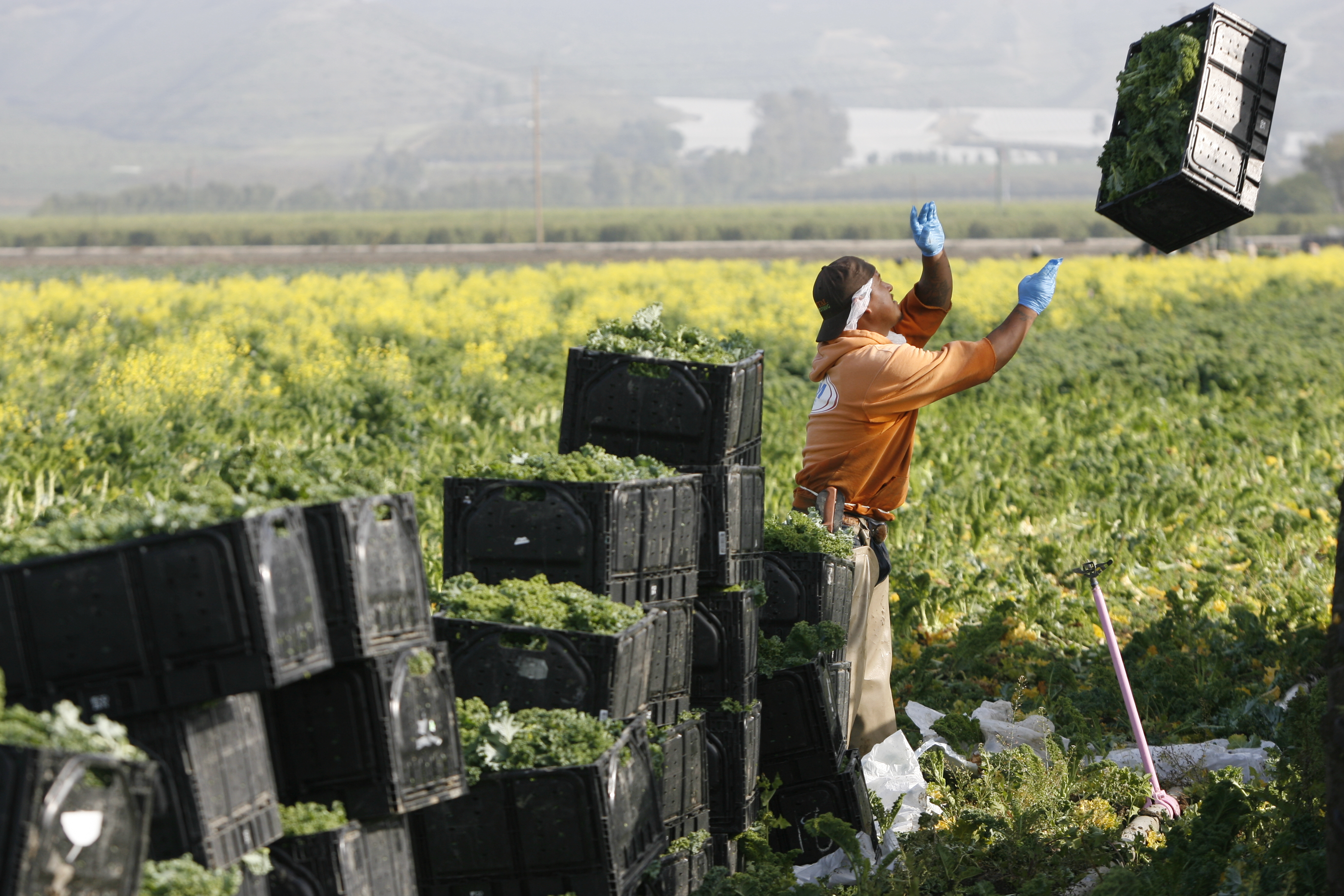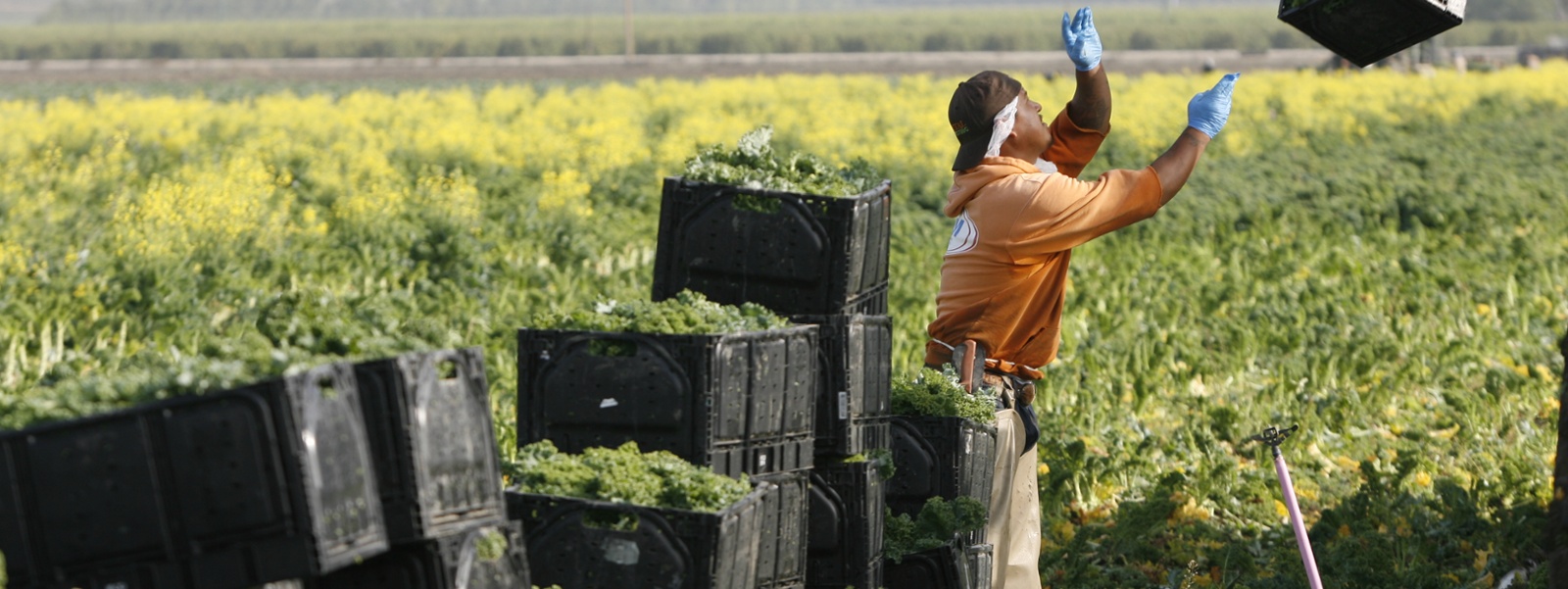Ventura County raids alarm California farm community

Farmworkers harvest kale at an Oxnard field in 2012.
Photo/Richard Quinn

By Caleb Hampton
Federal agents conducted immigration enforcement operations on farm sites across the Oxnard Plain in Ventura County, according to local farmers and government officials. The raids came as farms in the region were wrapping up the strawberry season and harvesting fresh vegetables, raspberries and other crops.
On June 10, between 5 and 10:30 a.m., agents attempted to enter at least 10 different farm fields and five packinghouses, said Maureen McGuire, chief executive officer of the Farm Bureau of Ventura County. McGuire said she spoke directly with farm employers and personnel to verify reports of immigration enforcement.
At least 35 farmworkers were detained in the operation, according to community organizations that provide legal aid to immigrants.
The workplace raids marked the first time the Trump administration’s mass deportation effort brought large numbers of immigration enforcement agents onto California farms. It came following orders from the White House that immigration authorities ramp up daily detentions of undocumented immigrants.
“Growers are very concerned about their workforce,” said Helen McGrath, a director at the Farm Bureau of Ventura County who grows citrus and avocados. She said she spoke with with three growers whose farms were visited by immigration authorities.
“It’s affected all of us,” a Ventura County strawberry grower said. The third-generation grower, who asked not to be named out of concern for his workers, said the operation was the largest immigration raid he had observed in decades, with “roving convoys” of Border Patrol vehicles driving among his fields.
The grower received a video on June 10 that one of his foremen recorded at a strawberry field that morning. It showed multiple Border Patrol vehicles appearing to pursue a minivan along dirt roads that wound between fields. According to the foreman, the van’s passengers worked at a nearby farm.
A separate pursuit, which was recorded in a widely circulated video, showed two agents on foot chasing and detaining a man in a field of peppers neighboring the grower’s strawberry fields.
“They raided a farm right across the street from us,” a different farmer told Ag Alert®.
Because immigration authorities reportedly lacked judicial warrants entitling them to enter private farms and packinghouses, they were denied access to several farm properties, according to the county Farm Bureau. California law prohibits employers from voluntarily allowing immigration authorities to access private worksites without a judicial warrant.
“Agricultural operations were well informed and well trained,” McGrath said. “Quite a few were able to close gates and not allow immigration enforcement officials onto their properties.”
Prevailing sentiments among farmers whose operations were targeted were “heartbreak and disappointment,” she said, “but also pride at how their employees handled the event, following protocols they’ve been trained to do.”
Barred from entering some farms, immigration authorities reportedly patrolled nearby. “They staged outside several packing sheds and were detaining people who were coming into work or leaving,” McGuire said. “A lot of people were scared to leave their places of employment.”

Photo/Courtesy image
The raids had an immediate impact on farm operations in the region, with the California Farm Bureau and Western Growers Association reporting worker absences that affected their members.
“Everybody in the workforce is fearful,” one farmer said. “Normally, these fields are full of workers, and there was nobody out there today.”
The strawberry grower said around 120 out of 300 workers scheduled to pick strawberries on his farm reported for work on June 11. With the season finishing, he said the strawberries being picked were destined for jam and preserves and that he could afford a day or two of delay, as “it’s less of a problem if they overripen a little.”
But other crops grown on the Oxnard Plain, such as raspberries and certain vegetables, could spoil this month if labor disruptions interfere with harvest, farmers said.
“It’s peak season for all commodities,” McGrath said, with planting, weeding, harvesting or processing of crops such as celery, cilantro, cabbage and radishes.
More than a third of U.S. farmworkers live in California, which produces many of the nation’s labor-intensive specialty crops such as fruits, nuts and vegetables. Farmers have cautioned that deportation of California farmworkers, more than half of whom are estimated to be undocumented, could imperil farms and threaten the country’s food supply.
“The current approach to federal immigration enforcement is having a disruptive effect on California’s rural communities and the farmers, ranchers, workers and families who live and work there,” Bryan Little, California Farm Bureau senior director of policy advocacy, said last week in a statement. “If federal immigration enforcement activities continue in this direction, it will become increasingly difficult to produce food, process it and get it onto grocery store shelves.”
The raids in Ventura County received widespread media coverage, and they appeared to capture the attention of lawmakers in Washington, D.C.
“They need to knock it off,” Rep. Glenn “GT” Thompson, R-Pa., who chairs the House Committee on Agriculture, told reporters, referring to workplace immigration enforcement on farms.
On June 12, during a press conference at the White House, President Trump discussed the possibility of sparing farmworkers from his administration’s deportation efforts.
“We can’t take farmers and take all their people and send them back because they don’t have maybe what they’re supposed to have,” Trump said. “We’re going to have to use a lot of common sense on that.”
The following day, a senior official at Immigration and Customs Enforcement issued new guidance to regional leaders of Homeland Security Investigations, the ICE division that typically conducts workplace enforcement operations, asking them to “hold off on all worksite enforcement” at farms, processing facilities, restaurants and hotels, according to The New York Times.
On Monday, ICE reportedly reversed that guidance and called for the continuation of workplace raids in those sectors.
The Department of Homeland Security did not respond to questions from Ag Alert® about details related to its operations in Ventura County or about the department’s immigration enforcement priorities.
Farm employers’ rights and responsibilities when responding to immigration enforcement
Farm employers and employees have constitutional rights federal agencies must respect. Farm Employers Labor Service advises taking these steps:
 • Have a plan. Designate an executive, manager or supervisor to be responsible for interacting with enforcement agents. This person should be trained to determine if agents have the right kind of warrant to access your worksite. If they have a warrant signed by a judge, the designated person should read the document and accompany agents at all times to ensure they do not go beyond the scope of their authority as specified in the warrant.
• Have a plan. Designate an executive, manager or supervisor to be responsible for interacting with enforcement agents. This person should be trained to determine if agents have the right kind of warrant to access your worksite. If they have a warrant signed by a judge, the designated person should read the document and accompany agents at all times to ensure they do not go beyond the scope of their authority as specified in the warrant.
• Deny access if agents do not have a judicial warrant. Under California law, farm employers may not allow immigration enforcement agents onto private worksites without a judicial warrant. If agents do not have a judicial warrant, the employer should say, “I cannot consent, and I do not consent.”
• Educate your workforce about their rights. Regardless of immigration status, everyone present in the U.S. is entitled to basic constitutional rights. Employees have the right to remain silent. They need not answer questions about their legal status or personal details. They should insist on speaking with an immigration attorney before answering questions or signing documents.
• Protect employees during enforcement actions. Advise employees not to run from agents. Fleeing can be seen as suspicious and entitle agents to pursue and detain individuals. You may record video of agents as long as you do not interfere with their permitted activities. Employees need not hand over identification documents to agents. Anyone detained should ask for an attorney and a show-cause hearing.
For more information, FELS members may visit www.fels.net/updated-dealing-with-immigration-enforcement-agencies-suggestions-and-courses-of-action-for-ag-employers.
Caleb Hampton is assistant editor of Ag Alert. He can be reached at champton@cfbf.com.
Reprint with credit to California Farm Bureau. Include this link:




